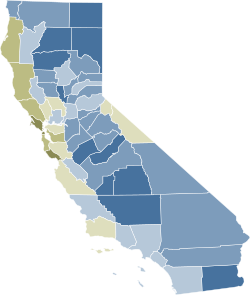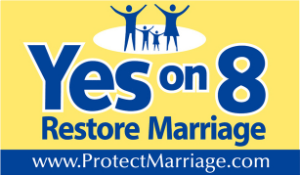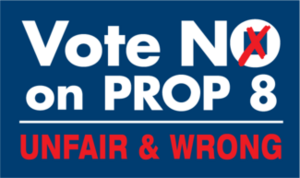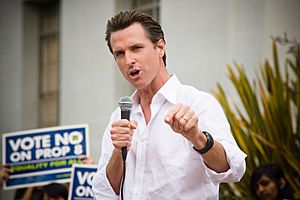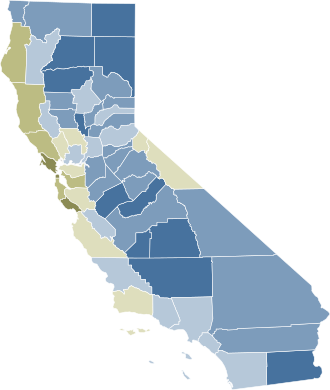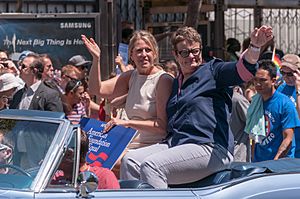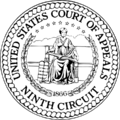2008 California Proposition 8 facts for kids
| Proposition 8 | ||||||||||||||||||||||
|---|---|---|---|---|---|---|---|---|---|---|---|---|---|---|---|---|---|---|---|---|---|---|
| Eliminates Rights of Same-Sex Couples to Marry | ||||||||||||||||||||||
| Date | November 4, 2008 | |||||||||||||||||||||
|
||||||||||||||||||||||
|
||||||||||||||||||||||
| Source: California Secretary of State | ||||||||||||||||||||||
Proposition 8, often called Prop 8, was a special vote in California. It was a change to the state's constitution that aimed to stop same-sex couples from getting married. Voters approved it in November 2008.
However, courts later said Proposition 8 was against the law. This meant same-sex marriage became legal again in California in June 2013.
Prop 8 tried to undo a 2008 court decision. That decision had said same-sex couples had the right to marry. Prop 8 added a rule to the California Constitution: "only marriage between a man and a woman is valid or recognized in California."
Even though a state court said Prop 8 was okay in 2009, federal courts disagreed. They said it was unconstitutional.
Contents
What Was Proposition 8?
Proposition 8 was a ballot proposition in California. This is a way for citizens to vote directly on new laws or changes to the state's constitution.
Prop 8 was titled: "Eliminates Rights of Same-Sex Couples to Marry. Initiative Constitutional Amendment." It added a new part to the California Constitution. This new part said: "Only marriage between a man and a woman is valid or recognized in California."
This change meant that same-sex couples could no longer legally marry in California. It went against a previous court ruling that had allowed them to marry.
How the Idea for Prop 8 Started
Before Prop 8, in 2000, California passed a law called Proposition 22. This law said the state would not recognize same-sex marriages.
But in 2004, the Mayor of San Francisco, Gavin Newsom, allowed same-sex marriages to happen. This caused a lot of discussion and led to a court case.
In 2008, the California Supreme Court ruled that Proposition 22 was unconstitutional. This meant same-sex couples could legally marry in California.
Opponents of same-sex marriage then created Proposition 8. They wanted to change the state constitution to ban it again. They hoped this would stop the court's decision.
Prop 8 did not affect "domestic partnerships." These are legal agreements that give some rights to couples, similar to marriage, but without the title. Also, Prop 8 did not cancel marriages that happened between May and November 2008.
Legal Challenges Before the Vote
Before the election, there were legal challenges to Prop 8. Some people tried to remove it from the ballot. They argued it was too big a change for a simple vote. But the court said it could stay on the ballot.
There was also a fight over the title and summary of Prop 8 on the ballot. The Attorney General, Jerry Brown, changed the title to "Eliminates Rights of Same-Sex Couples to Marry."
Supporters of Prop 8 said this wording was unfair. They argued it would make voters against the measure. But the court decided the new title was accurate.
The Campaign for and Against Prop 8
Both sides spent a lot of money and time on the campaign. Together, they spent over $100 million. This was a huge amount for a state ballot measure.
Thousands of volunteers also worked hard. They tried to convince California's 17.3 million registered voters. Money came from all 50 states and over 20 foreign countries.
Who Supported Proposition 8?
People who supported Prop 8 believed that marriage should only be between a man and a woman. They argued it was a very important part of society.
Some supporters also worried that if same-sex marriage was allowed, public schools would have to teach about it. They felt that gay people should not "redefine marriage for everyone else."
The main group supporting Prop 8 was ProtectMarriage.com. Many religious groups also supported it.
Political Figures Supporting Prop 8
- John McCain, a Republican U.S. Senator and presidential candidate, supported Prop 8.
- Newt Gingrich, a former Speaker of the House, also supported it.
- Mitt Romney, a former Massachusetts governor, donated money to groups supporting Prop 8.
Religious Organizations Supporting Prop 8
- The Roman Catholic Church strongly supported Prop 8. Bishops in California released statements in favor of it.
- George Hugh Niederauer, the Archbishop of San Francisco, worked to bring Catholics and Mormons together to support the measure.
- The Church of Jesus Christ of Latter-day Saints (LDS Church) also publicly supported Prop 8. The church asked its members to donate money and time to the campaign. Latter-day Saints gave over $20 million.
- Other religious groups like the Union of Orthodox Jewish Congregations of America and some Evangelical Christians also supported Prop 8.
Other Supporters
- The Grossmont Union High School District in San Diego County voted to support Prop 8.
- The Asian Heritage Coalition held a rally for Prop 8 in San Diego.
- Porterville's City Council was the only city council in California to pass a resolution supporting Prop 8.
- The San Diego branch of the Church of Scientology also signed an online petition for Prop 8.
Who Opposed Proposition 8?
Opponents of Prop 8 argued that the freedom to marry should be for everyone. They believed the California Constitution should give the same rights to all people.
They felt that Prop 8 would create different rules for different couples. They said that "equality under the law is a fundamental constitutional guarantee."
Equality for All was the main group against Prop 8. They ran the NoOnProp8.com campaign. Many political figures, religious groups, and businesses also opposed the measure.
Political Figures Opposing Prop 8
- Barack Obama, the Democratic presidential candidate, opposed Prop 8. He believed it was "divisive and discriminatory."
- Joseph Biden, the vice-presidential candidate, also opposed it.
- Arnold Schwarzenegger, the Republican Governor of California, opposed the initiative. He said he would uphold the court's ruling that allowed same-sex marriage.
- Nancy Pelosi, the U.S. House Speaker, and California's U.S. Senators, Dianne Feinstein and Barbara Boxer, also opposed Prop 8.
- Mayors of major cities like San Francisco, Los Angeles, and San Diego were against it.
Religious Organizations Opposing Prop 8
- All six Episcopal bishops in California opposed Prop 8.
- Many Jewish groups, including the Board of Rabbis of Southern California, voted against it.
- The Unitarian Universalists opposed Prop 8, seeing it as a civil rights issue.
- The California Council of Churches also asked for Prop 8 to be removed. They said it would limit religious freedom for churches that wanted to bless same-sex unions.
Other Opponents
- The League of Women Voters of California opposed Prop 8. They believed no group should face legal discrimination.
- Most local chapters of the National Association for the Advancement of Colored People (NAACP) also opposed it.
- Amnesty International said that states should not take away rights based on someone's minority status.
- Many Silicon Valley companies and executives urged a 'No' vote. Google and Apple Inc. both donated money to the 'No on 8' campaign.
- Many people in the entertainment industry opposed Prop 8. Actor Tom Hanks and director Steven Spielberg were strong opponents.
- The Los Angeles Unified School District Board of Education voted to oppose Prop 8. The California Teachers Association donated one million dollars to fight it.
"Whether You Like It or Not" Advertisement
Before the election, supporters of Prop 8 released a TV ad. It showed San Francisco Mayor Gavin Newsom saying about same-sex marriage: "This door's wide open now. It's going to happen, whether you like it or not."
Some people believe this ad helped Prop 8 pass. It made some voters worry about the future of marriage.
The Vote and Its Impact
On November 4, 2008, Californians voted on Proposition 8. To pass, it needed a simple majority of votes.
Prop 8 passed with 52.24% of the vote. This meant that same-sex marriage was no longer legal in California.
Exit polls showed that support for Prop 8 came from different groups of voters.
- African American voters showed strong support, with about 70% voting in favor. This was important because more African Americans voted that year due to Barack Obama being on the ballot.
- Hispanic and Latino voters also largely voted for Prop 8.
- People who said they were religious were the strongest supporters.
- Younger voters were more likely to vote against Prop 8 than older voters.
- Republicans were more likely to support it than Democrats.
Protests and Reactions After the Vote
After Prop 8 passed, many protests happened across California and the country. People gathered outside churches and in cities to show their disagreement.
- Thousands protested outside the California State Capitol in Sacramento.
- In San Francisco, thousands gathered at City Hall for a candlelight vigil.
- Protests also took place outside California, like at the headquarters of The Church of Jesus Christ of Latter-day Saints in Salt Lake City, Utah.
Some people organized boycotts of businesses that had supported Prop 8. This meant people stopped buying from those businesses to show their disapproval.
Legal Challenges to Prop 8
After Prop 8 passed, many lawsuits were filed to try and overturn it. These cases went to both state and federal courts.
State Court: Strauss v. Horton
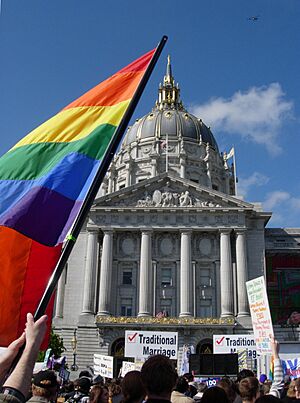
The California Supreme Court heard several lawsuits challenging Prop 8. These cases were combined into one called Strauss v. Horton.
On May 26, 2009, the state court ruled that Prop 8 was valid. However, it also said that the roughly 18,000 same-sex marriages that happened before Prop 8 passed would remain legal. This was an important part of the ruling.
Federal Court: Hollingsworth v. Perry
After the state court upheld Prop 8, a new lawsuit was filed in a federal court. This case was called Perry v. Schwarzenegger (later Hollingsworth v. Perry).
On August 4, 2010, a federal judge named Vaughn Walker ruled that Prop 8 was unconstitutional. He said it violated the Fourteenth Amendment of the U.S. Constitution. This amendment includes the Due Process and Equal Protection clauses, which ensure fairness and equal treatment under the law.
The judge said Prop 8 had no good reason to take away rights from same-sex couples. He temporarily stopped his ruling from taking effect while appeals were heard.
Appeals to Higher Courts
The State of California agreed with the ruling and chose not to appeal it. So, the groups who supported Prop 8 appealed the decision themselves.
The case went to the Ninth Circuit Court of Appeals. On February 7, 2012, this court also ruled that Prop 8 was unconstitutional. They said it was wrong for California to give marriage rights to same-sex couples and then take them away.
The case then went to the highest court in the country: the U.S. Supreme Court.
The Supreme Court's Decision
On June 26, 2013, the U.S. Supreme Court made its decision in Hollingsworth v. Perry. The Court ruled that the groups who supported Prop 8 did not have the legal right to appeal the case in federal court.
Because of this, the Supreme Court sent the case back to the Ninth Circuit. The Ninth Circuit then dismissed the appeal. This meant that the original federal judge's ruling, which said Prop 8 was unconstitutional, became the final decision.
The Supreme Court's decision did not directly say whether same-sex marriage was a constitutional right. Instead, it focused on who had the right to bring the case to federal court.
What Happened After the Supreme Court Ruling?
On June 28, 2013, the Ninth Circuit officially lifted its hold on the federal judge's ruling. This allowed same-sex marriages to start again in California.
Minutes later, the two couples who had filed the lawsuit, Kristin Perry and Sandra Stier, became the first same-sex couple to legally marry in California since 2008. The ceremony took place at San Francisco City Hall.
There were a few more attempts to stop same-sex marriages from resuming. However, the U.S. Supreme Court and the California Supreme Court quickly rejected these attempts. They confirmed that same-sex marriage was now legal across all of California.
Efforts to Repeal Prop 8 from the Constitution
Even after the court rulings, Proposition 8 was still technically in the California Constitution. In 2023, the California State Legislature voted to put a new proposal on the ballot.
This new proposal would formally remove Prop 8 from the state constitution. Voters will have the chance to approve this change during the 2024 elections.
Images for kids
-
Rally for Yes on Prop 8 in Fresno
-
Protesters at the "Day of Decision" rally marched up Market Street in downtown San Francisco following the California Supreme Court ruling.
See also
 In Spanish: Proposición 8 (California) para niños
In Spanish: Proposición 8 (California) para niños
 | Aaron Henry |
 | T. R. M. Howard |
 | Jesse Jackson |


